The most important battle you've probably never heard of
- Published
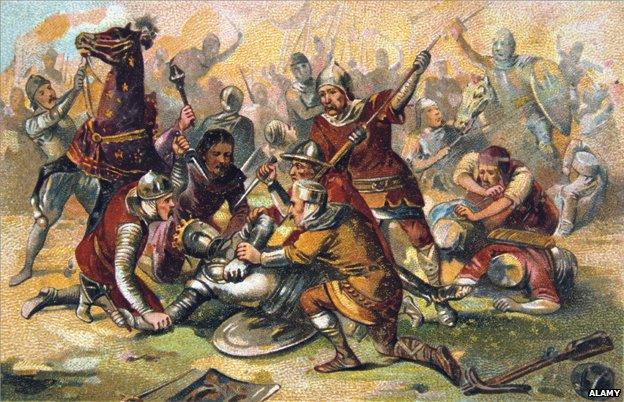
Exactly 800 years ago on Sunday, in a field next to what is now the airport of Lille, a battle was fought which determined the history of England.
Today few people in the UK have heard of Bouvines. It has none of the ring of an Agincourt or a Crecy. Probably that is because England lost it. But the battle of 27 July 1214 was just as significant as England's later victories over the French. Maybe more so.
"Bouvines is the most important battle in English history that no-one has ever heard of," says John France, professor emeritus in medieval history at Swansea University.
"Without Bouvines there is no Magna Carta, and all the British and American law that stems from that. It's a muddy field, the armies are small, but everything depends on the struggle. It's one of the climactic moments of European history."

Five other decisive Anglo-French battles
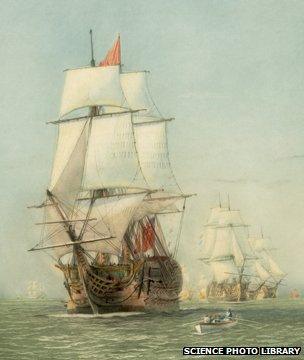
Chosen by historian Tom Holland
Hastings (1066): 1066 and all that. Enough said…
Trafalgar (1805): Had Nelson's fleet been destroyed, it is hard to see how Britain could have avoided invasion by Napoleon
Relief of Orleans (1429): When Joan of Arc saved France, she ensured that Agincourt would not, in the long run, be decisive
Quiberon Bay (1759): A battle won by the British in the teeth of gales and treacherous waters, it heralded the global supremacy of the Royal Navy
Quebec (1759): The second decisive battle won by the British in the annus mirabilis of 1759, it ensured a largely English-speaking future for North America

The story of Bouvines begins with hapless King John, and his determination to retake the French lands he had lost in Normandy and Anjou. His opponent was the King of France, Philippe-Auguste, equally determined to establish French power and prestige.
King John had alienated most of the English nobility. The barons were angry at the way he extorted money, and excluded them from court. They refused to fight his wars. So for his campaign of reconquest in France, John forged a European alliance. He recruited other enemies of the French crown - the German Holy Roman Emperor Otto and the Counts of Flanders and Boulogne - and devised a two-pronged attack.
While King John landed in La Rochelle and advanced from the south-west, his allies - with an English contingent under John's half-brother William of Salisbury - were to attack the French from the north. In the event King John's advance in the south made little headway, though it did divert a good chunk of Philippe-Auguste's army. The key confrontation was in the north, in that perennial European battle-zone - the fields of Flanders.
Today the village of Bouvines is a small community just outside the reach of the Lille conurbation and a few miles from the Belgian border. There is a bridge there over a small river called the Marque, today canalised but which 800 years ago sprawled over a large stretch of marsh.
King Philippe-Auguste's army had advanced east from Lille, planning to lay waste to the lands of Hainault which belonged to the Count of Flanders. Learning of the larger coalition army arrayed against him, the king turned back to Lille. But as his forces were crossing the bridge at Bouvines, the enemy caught up. They had come through a forest from the south.
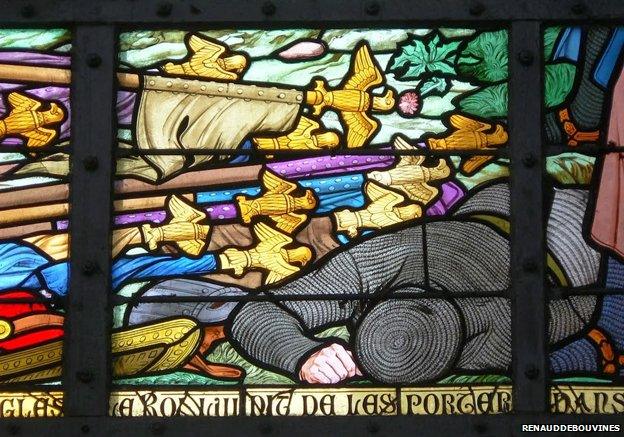
The battle was fought on a hot Sunday afternoon and lasted four or five hours.
"It would have been a real scene of butchery. In these early medieval battles, archery had not been fully developed so the killing was up-close. And the leaders were in the thick of it," says local historian Alain Streck.
One of the main weapons used by foot-soldiers was a pike with a hook, which was used to pull knights off their horses. The French king was himself unhorsed by this method, and only saved by his bodyguard.
It was a close-run thing, but in the end the French prevailed. The Count of Flanders was captured. The German emperor fled. Afterwards 700 captured mercenaries from Brabant were put to the sword.
"What told in the French favour was their unified command," says John France. "The allies were a coalition army that had only got together for the first time four days before the battle. In those days coalition armies like that were inherently unstable."

What is Magna Carta?
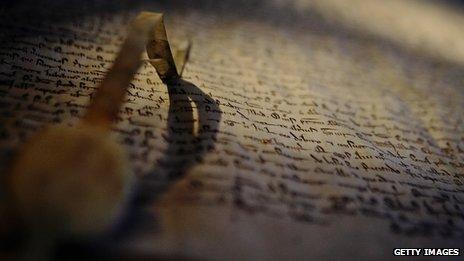
Magna Carta outlined basic rights with the principle that no one was above the law, including the king
It charted the right to a fair trial, and limits on taxation without representation
It inspired a number of other documents, including the US Constitution and the Universal Declaration of Human Rights
Only three clauses are still valid - the one guaranteeing the liberties of the English Church; the clause confirming the privileges of the city of London and other towns; and the clause that states that no free man shall be imprisoned without the lawful judgement of his equals
The British Library has two copies of the 1215 Magna Carta
Source: The British Library

King John was not at the battle. He was still in the south. But his dreams of reconquest were dashed. He returned to England, humiliated and impoverished. Less than a year later - his barons increasingly belligerent and the French now revealing their own designs on the English crown - he was forced to sign the Magna Carta, which limited his power and formed the basis of English democracy.
"The road from Bouvines to Magna Carta was direct and short," says Sean McGlynn, an expert in the period at the Open University. "Bouvines was the last straw. If John had won the battle, Magna Carta could have been avoided. But it was the decisiveness of the defeat. All his taxation had gone to waste. He was weakened, and the barons saw their opportunity."
John France adds: "If the English and their allies had won at Bouvines, John would have had the plunder and the prestige. The baronial opposition would have melted away. This was that rare thing: a battle that was genuinely decisive."
And not just for the English. In France the battle is remembered today for exactly the same reason that it is forgotten in England - because France won. What followed Bouvines was a golden era for the French monarchy - the Capetian dynasty, to which Philippe-Auguste belonged, was the dominant force in Europe for the next 100 years.
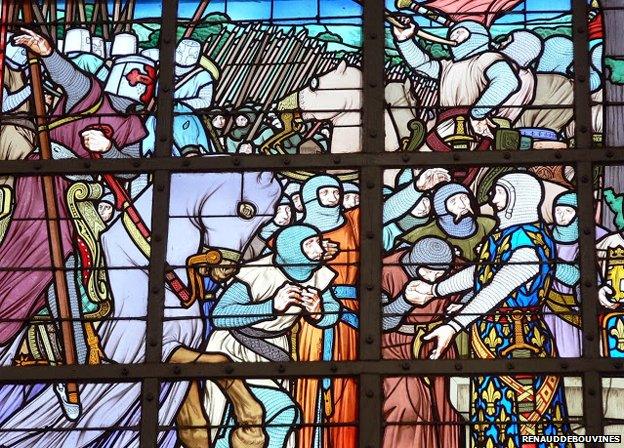
"If Philippe-Auguste had lost, the west of France would have been English, the north would have been Flemish, and the east would have been German," says Alain Streck. "But he won. The contours of the French kingdom were set, and the Capetians were able to start organising a state. It was really the beginning of French national consciousness."
In 1216 Philippe-Auguste's son Louis was welcomed in London, receiving the homage of a third of the English barons and of King Alexander of Scotland. In the title of Sean McGlynn's book, it was "The forgotten invasion of England," and an English King Louis I was a distinct possibility. But King John died, and the barons deserted Louis for the boy-king, Henry III.
Eight hundred years on, the village of Bouvines has been marking the anniversary with re-enactments and other events. On Sunday there is a church service, attended by a government minister and representatives from France's two rival royal houses.

Five other obscure but decisive battles
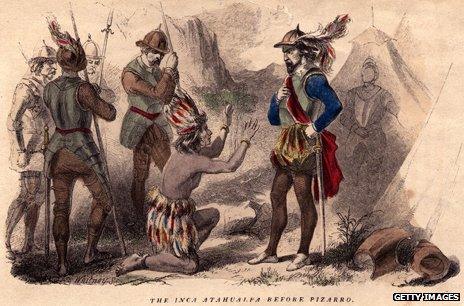
Chosen by historian Tom Holland
Cap Bon (468): A Roman fleet sent to recapture North Africa from the Vandals was incinerated by fire-ships off the coast of Tunisia. This was the moment when the fall of the Roman Empire in the West became inevitable
Qadisiyya (636): When an Arab invasion force wiped out the cream of the Persian army on the plains of Iraq, it not only doomed the venerable Sasanian empire, but played a key role in the emergence of Islam, ensuring its long-term future as the major religion of the Middle East
Diu (1509): A key waymark on the rise of Europe to global power, the battle was fought in the Arabian Sea between an assortment of Islamic powers and a Portuguese fleet. Victory for the Portuguese enabled them to establish their Asian empire
Cajamarca (1532): The ambush and capture of the ruling Inca emperor by Pizarro and his band of conquistadors was a key moment in ensuring that South America would end up Christian and Hispanic
Koniggratz (1866): Featuring 250,000 men on either side, this decisive battle of the Austro-Prussian War established Prussia as Europe's greatest military power and cleared the path to German unification

The battle of Bouvines looms particularly large in nationalist interpretations of French history.
After the defeat by the Prussians in 1870, there was a surge of French patriotism. The church at Bouvines was rebuilt with stained glass windows (now a national monument) recounting the story of the victory and in 1914 the 700th anniversary of the battle was celebrated with almost venomous anti-German sentiment.
"It is quite extraordinary that in the two world wars Bouvines church was in the hands of the Germans - but they never pulled down the stained glass windows showing the German emperor in headlong flight," says Alain Streck. "Maybe they did not look hard enough!"
This year's commemorations are built around the inoffensive themes of "Europe, peace and youth".
The trouble with Bouvines is that "it does not fit into the modern European narrative", says John France. "Nowadays the EU has a huge budget for academic studies, but they have to comply with the theme of Europe as a big happy family. That is why Bouvines tends to get neglected."
But Bouvines was a turning point for Europe, and above all for France and England. England withdrew to its insular priorities and began adapting its institutions to the new internal balance of power. The French monarchy emerged enormously enhanced and Paris became the centre of a national life.
In the words of the French 19th Century historian Ernest Lavisse: "The two nations set off in different directions. England headed towards liberty; France towards absolutism."
Subscribe to the BBC News Magazine's email newsletter to get articles sent to your inbox.